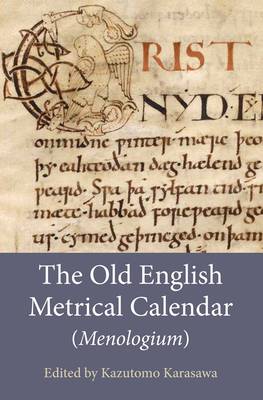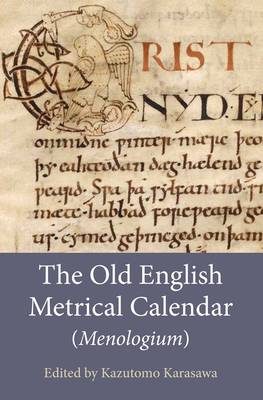
Bedankt voor het vertrouwen het afgelopen jaar! Om jou te bedanken bieden we GRATIS verzending (in België) aan op alles gedurende de hele maand januari.
- Afhalen na 1 uur in een winkel met voorraad
- In januari gratis thuislevering in België
- Ruim aanbod met 7 miljoen producten
Bedankt voor het vertrouwen het afgelopen jaar! Om jou te bedanken bieden we GRATIS verzending (in België) aan op alles gedurende de hele maand januari.
- Afhalen na 1 uur in een winkel met voorraad
- In januari gratis thuislevering in België
- Ruim aanbod met 7 miljoen producten
Zoeken
The Old English Metrical Calendar (Menologium)
€ 59,95
+ 119 punten
Omschrijving
First modern text and English translation of an important Anglo-Saxon poem dealing with the liturgical year. WINNER of the International Society of Anglo-Saxonists 2017 Publication Prize: Best Edition The late tenth-century Old English Metrical Calendar (traditionally known as Menologium) summarises, in the characteristicheroic diction and traditional metre of Old English poetry, the major course of the Anglo-Saxon liturgical year. It sets out, in a methodical structure based on the basic temporal framework of the solar/natural year, the locations of the major feasts widely observed in late Anglo-Saxon England. Such a work could have been a practical timepiece for reading the dates of the Anglo-Saxon Chronicle, for which it serves as a kind of prologue in the manuscript.The clearly domestic perspective of the poem, which fits in the manuscript context, is also noteworthy, while the poem also reveals various interesting characteristics in its grammar, vocabulary and prosody.
This is the firstfull modern edition of the poem, and is accompanied by a facing translation. The introduction provides an extensive discussion of matter, content, style, and context, while the commentary offers further information. The volume also includes the texts and translations of a number of analogous works.
This is the firstfull modern edition of the poem, and is accompanied by a facing translation. The introduction provides an extensive discussion of matter, content, style, and context, while the commentary offers further information. The volume also includes the texts and translations of a number of analogous works.
Specificaties
Betrokkenen
- Uitgeverij:
Inhoud
- Aantal bladzijden:
- 245
- Taal:
- Engels
- Reeks:
- Reeksnummer:
- nr. 12
Eigenschappen
- Productcode (EAN):
- 9781843845997
- Verschijningsdatum:
- 21/05/2021
- Uitvoering:
- Paperback
- Formaat:
- Trade paperback (VS)
- Afmetingen:
- 150 mm x 33 mm
- Gewicht:
- 408 g

Alleen bij Standaard Boekhandel
+ 119 punten op je klantenkaart van Standaard Boekhandel
Beoordelingen
We publiceren alleen reviews die voldoen aan de voorwaarden voor reviews. Bekijk onze voorwaarden voor reviews.








